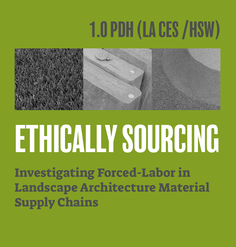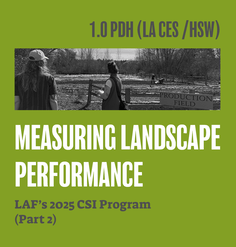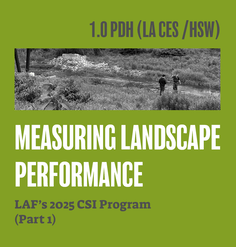Findings & Insights from LAF's 2018 CSI Program
Recording from live webinar on 8/6/2018
Measuring Landscape Performance: Findings & Insights from LAF’s 2018 CSI Program
The Landscape Architecture Foundation’s Case Study Investigation (CSI) program supports faculty-student research teams who work with designers to assess and document the performance of sustainable landscape projects as Case Study Briefs. In this webinar, participants from the 2018 CSI program present their process and most compelling findings from their efforts to quantify environmental, economic, and social benefits. The four teams studied seven exemplary landscape projects, including Hunter’s Point South Waterfront Park in Queens, Historic Fourth Ward Park in Atlanta, and Tom Hanafan River’s Edge Park in Council Bluffs, Iowa.
Presenters
- Catherine De Almeida, Assistant Professor, Hannah LoPresto and Brandon Zambrano, MLA Candidates, University of Nebraska-Lincoln
- Lisa DuRussel, Visiting Assistant Professor of Practice, Pennsylvania State University
- Rachael Shields, MLA Candidate, University of Georgia
- Pavlina Ilieva, Associate Professor of Architecture, and Naomi Wong Hemme, Master of Architecture Candidate, Morgan State University
Learning Objectives
- Understand how the Landscape Architecture Foundation’s Case Study Investigation program is furthering landscape performance research.
- Explore specific metrics and methods used to evaluate environmental and social performance of landscape projects.
- Learn about the goals and sustainable features of seven exemplary landscapes.
NOTE: This course can no longer be viewed to earn credits through the Landscape Architecture Continuing Education System (LA CES). Please visit our Recorded Webinars page to find newer recordings that can be viewed to earn LA CES Professional Development Hours (PDHs).











